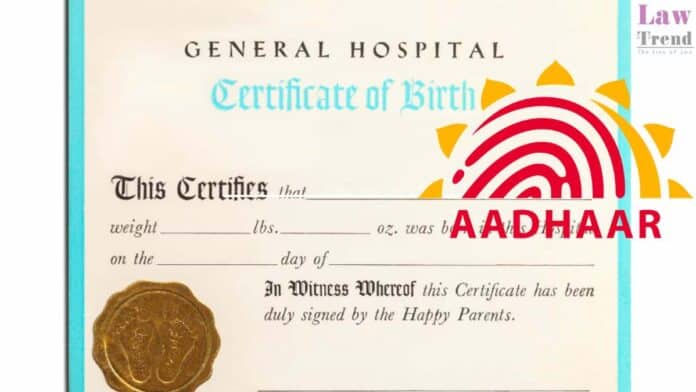Starting from October 1st, the new Registration of Births and Deaths (Amendment) Act, 2023 will allow birth certificates to serve as a single document for a wide range of purposes. This includes admission to educational institutions, obtaining a driving license, registering an Aadhaar number, preparing voter lists, registering marriages, applying for government jobs, and other purposes as determined by the central government.
The main objective of this Act is to establish a comprehensive national and state-level database of registered births and deaths. This move is expected to enhance the efficiency and transparency of public services and the delivery of social benefits through digital registration.
The Union Ministry of Home Affairs announced this development through a notification released on Wednesday. The notification stated, “The provisions of the said Act shall come into force from October 1, 2023, in accordance with the powers conferred by sub-section (2) of section 1 of the Registration of Births and Deaths (Amendment) Act, 2023 (20 of 2023).”
Union Minister of State for Home Nityanand Rai played a key role in pushing for the amendment of the 1969 Act. The Registration of Births and Deaths (Amendment) Bill 2023 was passed by both the Rajya Sabha and the Lok Sabha during the Monsoon Session. While the Rajya Sabha approved the bill through a voice vote, the Lok Sabha passed it on August 1st.
Under the new Act, the Registrar General of India will be responsible for maintaining a central database of registered births and deaths. Chief Registrars appointed by the states, as well as Registrars appointed by states for local areas, will share birth and death data with the national database. Each state will also maintain a similar database at the state level.
Previously, specific individuals were required to report births and deaths to the Registrar. With the new Act, it is now mandatory for these individuals to provide the Aadhaar numbers of the parents and the informant in cases of births. This requirement also extends to the jailor in case of births in prisons and the manager of hotels or lodges in cases of births occurring in such establishments.
Furthermore, the Act extends the list of specified individuals to include adoptive parents for non-institutional adoptions, biological parents for births through surrogacy, and the single parent or unwed mother in the case of a child’s birth.
Also Read
According to the legislation, the national database may be shared with other authorities responsible for maintaining different databases, such as population registers, electoral rolls, and ration card records, among others. However, any use of the national database must be approved by the central government.
Similarly, state databases may be shared with authorities responsible for maintaining other state-level databases, subject to approval by the respective state governments.
The Act also establishes an appeal mechanism for individuals to contest any action or order issued by the Registrar or District Registrar. Such appeals must be submitted within 30 days of receiving the action or order, and the District Registrar or Chief Registrar is required to provide their decision within 90 days of receiving the appeal.




